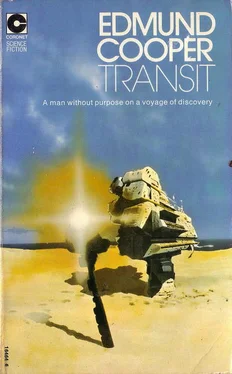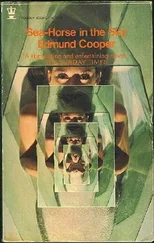Then suddenly he heard a tiny, dry crackle—as of fine splinters of glass being broken. For a fraction of a second he thought he had simply imagined the sound. But at the same time the golden ball just disappeared.
It did not go up or away. It did not make any loud noise or create any turbulence in the air. What it did do was so utterly absurd as to give Avery serious doubts about his own sanity.
It simply faded.
A golden sphere, thirty yards in diameter, whose surface seemed to have the fluid iridescence of a massive globule of molten metal—to say nothing of the intense heat—just faded before his eyes. For a moment its outline appeared to vibrate intensely. Then it became transparent. And there was nothing.
Avery stood and stared. And blinked. The pain was going from his eyes. He felt drunk and unsteady and stupid and empty. He felt that he could no longer trust himself to think—just as he could certainly not trust himself to see.
There was no mark on the sand. Nothing had been disturbed, nothing at all. It was as if the mysterious sphere had never been.
That, of course, was the answer, he told himself reluctantly. After a couple of days or so as the prisoner of a computer in a spaceship and a night and a day on an island where it was possible to see two moons and sixlegged rabbits, who would not be subject to visions?
Yet he did not really believe it was a vision, just as he did not really believe that the nebulous land-shape he had seen on the horizon was a vision.
What then? Answer: he was going slightly—ever so gently and inevitably—clean out of his head. The leader of the expedition! Stark staring!
Anybody want to place bets on group survival, gents, with dear old demented Richard Avery running the show? Stand by to repel boarders, folks, we’re being invaded by twenty-four-carat balloons. Never mind! All you have to do to cause the bastards to disappear up their own spherical arses is to make a noise like splinters of glass with schizophrenia.
Ah, that was it! The noise. Not splinters of glass. Static electricity. The crackle you get with a sweater when you take it off in a dry atmosphere. Rub two girl guides together in a dry climate and Christ, he thought. This won’t do. I’ve got to dig a nice little, warm little, dark little hole representing sanity and bury the elasticated remnants of my mind in it before they go snapping off in a glorious bloody exeunt.
Maybe everything’s an illusion. Maybe Barbara and Mary and Tom and two moons and an intelligence-testing computer and a skyful of alien stars have all come bursting out of my own sweet bullshitting unconscious mind….
Maybe I’m in a lovely nut-house in London, and the next thing I know I’ll be waking up after a long shot of electroplexy to collect my season ticket for rug-making—
Barbara, Mary and Tom. He wanted to see them. He wanted to see them, touch them, talk to them as he had never wanted anything before in his life. Above all, he wanted the bitter security of not being alone.
He began to walk quickly, past the pool, back to camp. But he could not control himself. The walking became faster and faster. Then it became a headlong sprint. He was too old for that kind of pace. He had smoked too many cigarettes, he had let his body sag into a middle-aged bundle of bones and perished rubber. But he didn’t care. Speed was the thing.
He ran until the very air seemed to grate like gravel in his lungs. He ran until the pain in his chest was such that he expected his heart to literally break out like a tortured fugitive. He ran until the bright beach ahead began to darken and the forest and the sea swirled about him like green and turquoise mists that would presently close above his head and bury him in a warm sweet vapour of unbeing.
He ran until he heard the shots.
One, two… three… four—five—six…
They sounded very near. They sounded almost as if they were inside him.
They acted like a signal of release on his overworked body. He fell flat on his face in the sand, and lay there panting and groaning.
He wanted to find out about the shots. He rolled over and tried to get up. But the pain wouldn’t let him. It sat on his chest, an invisible conqueror, and sent needle probes of anguish and shame through his trembling limbs.
He lay there until the edge of the pain had dulled, and his lungs no longer felt like a couple of ripped balloons. He lay there for perhaps five minutes, sick with anxiety, his mind cataloguing all the more lurid possibilities like a hysterical computer. Eventually, after about three or four minutes that stretched into dreadful hours, the various aches in his body were reduced to a scale on which they could be handled. He summoned the strength to get to his feet—a tricky operation—and began to hobble back towards the camp…. The leader of the expedition! He smiled cynically. A goddamned bloody marvellous leader of the expedition he’d made! He couldn’t even lead a self-respecting troop of boy scouts…
There was nobody at Camp One when Avery arrived. There was nothing but devastation. The tents, flapping drunkenly in the slight breeze, with half their ropes severed, seemed to gaze at him with mute reproach. The camping equipment was scattered crazily over quite a wide area. The trunks had been flung about, and so had their contents.
Avery found his paints and canvas boards half buried in the sand. Many of the packets of cigarettes had been opened, crushed and tossed carelessly aside. Several of the L.P. records had been wantonly smashed, but strangely enough the record player itself had survived.
Mary’s sweets lay scattered with various items of clothing and underwear, suggesting, ludicrously, the combined remains of a rather violent and extravagant children’s party and a communal sex-orgy. Barbara’s possessions reeked of whisky—several of her bottles had been smashed apparently just for the hell of it. But the biggest surprise of all came from the widely distributed contents of Tom’s trunk.
Avery remembered how only the night before—already it seemed a year ago—Tom had been so coyly secretive about his possessions. Well, the secret—or secrets—was out now; and so was the reason for Tom’s reticence. The tom and tattered remnants of his fantasy world lay grotesquely and garishly on the sand—dozens of photographs and colour prints of pin-up girls. Some evidently taken from magazines and some rather too revealing to be acquired by other than ‘private subscription’. There they lay in various states of dress, undress, provocation, invitation and so on. Among them were even snaps of one or two naked and bored-looking couples engaging in the sexual act in various and somewhat improbable postures.
Somehow, in this place and in this situation, the total impression was not of pornography exposed but of a cruel and tragic illusion. Poor Tom! Here were the symbols of his loneliness, his personal hell, his private despair.
Before he did anything else at all, before he even thought of anything else, Avery was moved to gather up the pathetic scraps of card and paper and try to get them back into Tom’s trunk, as if they had never been disturbed. It was not decent in the true sense of the word that a man’s weakness should be exposed and consequently mocked in such a fashion.
Even as he gathered them up, Avery knew that his hope of conrtaling what had happened was a futile one. And what the hell did it matter, anyway? Quite possibly Tom was dead by now, if the destruction here was anything to go by. Quite possibly the girls were dead as well and he, Avery, was wasting valuable time and effort for a stupid bloody reason when he ought to be concentrating entirely upon problems of personal security and survival. But he went on collecting the sad survivors of Tom’s pornographic collection just the same.
Читать дальше












